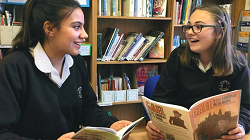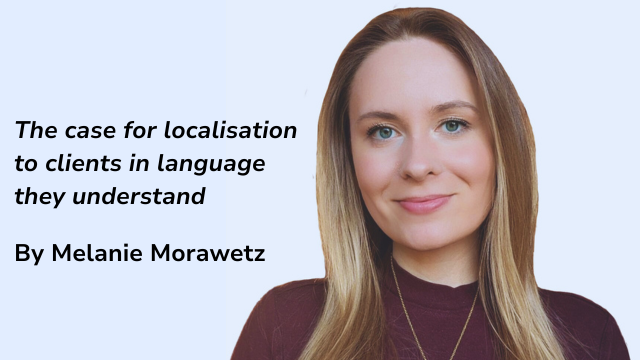-
QUALIFICATIONS
- For Linguists Worldwide
- For UK Public Services
- Preparation
- Policies & Regulation
-
MEMBERSHIP
- Join CIOL
- Professional Membership
- Affiliate Membership
- Chartered Linguist
- Already a member?
- Professional conduct
- Business & Corporate Partners
-
LANGUAGE ASSESSMENTS
- English
- All Other Languages
-
EVENTS & CPD
- Webinars & Events
- CIOL Conferences
- Networks
- CIOL Mentoring
-
NEWS & VOICES
- News & Voices
- CIOL eNews
- CIOL Awards
- The Linguist Magazine
- Jobs & Ads
-
RESOURCES
- For Translators & Interpreters
- For Universities & Students
- Standards & Norms
- CIOL & AI
- All Party Parliamentary Group
- In the UK
- UK Public Services
- Find-a-Linguist
Moving Adelante
 In a small computer room with Mexican-style artwork adorning the walls and Frida Kahlo-inspired cushions softening the benches, Lucy is talking about volunteering at a hispanic nursery while studying for her Spanish A-level. “I went every Saturday morning last term,” says the 17-year-old student at Channing School in North London. “It was really cool to be able to practise speaking with people whose first language is Spanish and having that exposure to Latin America.” Lucy, seven of her classmates and their Spanish teacher, Catriona Kyle, are gathered in the Latin American Diner, as the room is known, to tell me about the school’s immersive Spanish-language programme.
In a small computer room with Mexican-style artwork adorning the walls and Frida Kahlo-inspired cushions softening the benches, Lucy is talking about volunteering at a hispanic nursery while studying for her Spanish A-level. “I went every Saturday morning last term,” says the 17-year-old student at Channing School in North London. “It was really cool to be able to practise speaking with people whose first language is Spanish and having that exposure to Latin America.” Lucy, seven of her classmates and their Spanish teacher, Catriona Kyle, are gathered in the Latin American Diner, as the room is known, to tell me about the school’s immersive Spanish-language programme.
Clara talks about singing in Spanish with the choir at a hispanic-themed spring concert. Hannah speaks of a careers event which “broke down misconceptions about languages not being useful” by inviting linguists in varied professions to talk about their work. Lili mentions the “motivating” week-long residency of the Cervantes Theatre in the school’s Arundel Centre. “Having them come to school shows that Channing is really passionate about the language,” she says. The production of La Casa de Bernarda Alba, one of the texts on the A-level syllabus, attracted audiences from across Europe.
From the decor in the room – created by Year 7 students as part of a project on Mexican folk art – to plaques with inspirational quotes in the corridors, the school’s commitment to language learning is clear. And such details are not lost on its students. “The Adelante Strategy started a few years ago, and around the school you feel the influence everywhere – you feel how highly Spanish is appreciated here,” says Julia, who is also in Year 12.
To be precise, the Adelante Strategy was launched at Channing, an independent school for girls aged 4-18, in 2016. “I wanted something that would be a real feature of this school. Lots of schools teach Spanish, but I wanted us to have a real focus on it,” explains Headmistress Barbara Elliott. The aim was not to become a bilingual school but “to make proficiency in Spanish a feature of a Channing education”.
That meant not only switching the main taught language from French to Spanish, but establishing a programme that would bring Spanish into all subject areas. “If the Art Department was looking at a trip to Madrid or Amsterdam, well, go to Madrid!” explains Elliott, a linguist herself, who studied French and Spanish at Cambridge.
It was clear from the outset that Adelante – a key part of Channing’s five-year strategic plan – would require leadership, and Kyle was appointed in 2017. “Because I have a member of my senior leadership team who is not only Director of Modern Languages but also Leader of the Adelante Strategy, the strategy is given the status and the funding it needs to go from strength to strength,” says Elliott. Kyle is now working on the Adelante strand of the strategic plan for 2020-2025.
From teaching to events management
“One of the key things is that we have somebody on the senior team who is a linguist, who can raise the profile of languages and do it with real belief. Most members of senior teams do things related to the day-to-day running of the school, the timetable, the pastoral care. My role is unique,” she says. “Time is really important. A large part of my job involves the organisation and coordination of Spanish-themed events, and a good amount of my time is spent trying to make connections with people and organisations whose missions are aligned with our own.”
Accommodation needs to be arranged for visiting authors, enrichment days need to be planned, and connections need to be made with potential speakers. Kyle is currently organising a day at the London Paella School with the Head of Year 7 and an immersive ‘secret agent’ experience based around Spanish translation for Year 8.
“The success of the programme is down to a combination of ideas, time, relationships and funds. And that’s where we’re very lucky in this school,” she adds. These all-important relationships are not just with external providers but also with staff and parents at the school. A key part of the strategy is for each department to include something in its annual development plan that supports the learning of Spanish. When Year 8 go to Cádiz, for example, they do geography fieldwork there, surveying passersby about tourism in the area.
Kyle sees it as her responsibility to ensure that staff are on board with the programme. “We’ve run Spanish lessons after school for teaching and support staff, trips to Santander and Cádiz, and other social events,” she says. “There has been flamenco dancing, a Spanish wine-tasting evening, and I’m currently trying to bring a Latin American band to the school. There is widespread enthusiasm for Spanish and great support from colleagues.”
Parental support is also key. As Channing becomes known for its Spanish programme, parents are choosing the school partly on the basis of its language offer, but many of the girls joined before Adelante was introduced. Concerts, plays and other cultural events help to enthuse the whole school community.
One parent helped to set up an exchange with a school in Puebla, Mexico. Spanish enrichment activities such as this help to instil an appreciation for the language from a young age. Children in the junior school are taught by specialist Spanish teachers at least twice a week from age 4. Their PE lessons are supported by the senior school Spanish Assistant, who gives instructions in Spanish for the children to repeat.
A transferable model?
While a fee-paying school such as Channing can make funds available for senior staff, professional speakers and a wide range of activities, state schools may struggle to deliver such an ambitious programme with the current pressures on funding. There are, however, elements of Adelante that could be adopted by cash-strapped schools across the country. Most already offer careers events, inspirational speakers, cultural outings and trips abroad. Establishing a language focus to such activities can make a big impression on students.
Talking to Channing’s sixth-form hispanists, it is clear that small details have a lasting impact. “When you walk around school, you see little things that show how important it is to know another language – these signs that show that Spanish is valued,” explains Chiara.
Later, I meet a group of Year 9s in a room off the main library that is dedicated to foreign language books. To make it easy for students to find what they need, the books are categorised by age and language (the school also teaches French, German and the Classics, and has a lunchtime Mandarin club). “When I came to Channing, the language books were in disparate places in the library. It wasn’t really obvious where you’d go if you wanted a book in Spanish or German or French,” says Kyle. “So I asked the librarian if we could look at having a space for languages.” This relatively small change has greatly improved access to books in other languages.
The introduction of a reading challenge – a competition with a simple format whereby the student who reads the most Spanish books wins – has also helped. Maria, 14, speaks passionately about her experience: “In order to learn a language you really need to immerse yourself in it, so the challenge really did help because you’re reading books in Spanish and gaining a huge vocabulary from that.” The contest is heavily incentivised, with students winning house points as well as Spanish-themed prizes.
“It’s also about making things feel prestigious,” says Kyle. When students had the opportunity to meet the Peruvian Ambassador, for example, they had to apply in Spanish, showcasing what they knew about Peru and the work of embassies. Having to earn their place on the trip reinforced the value the school attached to it, and it is this sense of the value of languages – and of being multilingual – that comes across when speaking to pupils of different ages.
In three years, the Adelante programme has had a huge impact, with GCSE take-up improving dramatically. “For me, the success of the strategy will be seen in increased numbers of students taking Spanish at GCSE and A level, more going on to study Spanish or languages at university, and beyond that, more students going out into the world of work with strong language skills,” says Kyle. And while Channing is in a particularly privileged position, elements of the initiative could be brought into schools across the UK to inspire children to learn languages.
Filter by category
More
The Chartered Institute of Linguists (CIOL), Incorporated by Royal Charter, Registered in England and Wales Number RC 000808 and the IoL Educational Trust (IoLET), trading as CIOL Qualifications, Company limited by Guarantee, Registered in England and Wales Number 04297497 and Registered Charity Number 1090263. CIOL is a not-for-profit organisation.








